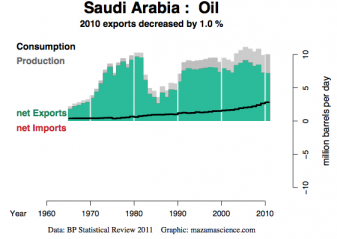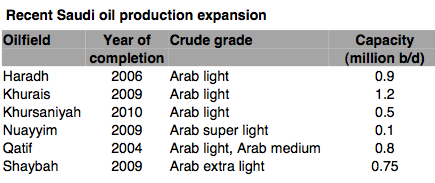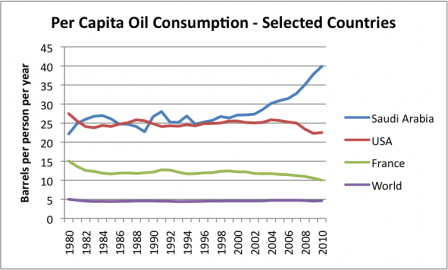
- All Instrument Types
- Indices
- Equities
- ETFs
- Funds
- Commodities
- Currencies
- Crypto
- Bonds
- Certificates
Please try another search

Which stocks will surge next?
Saudi Arabia – Headed for A Downfall?

Saudi Arabia recently announced that it had halted a $100 billion oil production expansion plan to raise capacity to 15 million barrels a day by 2020. At this point, the country claims to have capacity of 12 million barrels a day. What does this mean for its future? Let’s take a look behind the figures.

The figure shows that Saudi Arabia has not been increasing its production for many years. At the same time, the country’s own oil consumption has been rising rapidly. The combination means that oil exports have already started declining.
Saudi Arabia tells us that its crude oil capacity is 12 million barrels a day. In fact, its crude oil production has not exceeded 10 million barrels a day in recent years, according to EIA data. Perhaps it can produce a bit over the 9.9 million barrels a day it produced in August 2011, but this has not yet been proven.
If we look at recent additions to crude oil capacity, we find this list, according to Jadwa Investments.

While Saudi Arabia claims that these additions have added to total capacity, I think we should question whether this is really true. The amount of the additions on this list would seem to more or less offset a decline rate of 5% or 6% per year, and such a decline should be at least considered as an alternate explanation. It is possible, too, that the explanation is somewhere in between–a small capacity increase, but some of the new production is offsetting decline.
Between now and 2020, we know of relatively little additional crude oil capacity to be brought on line. The only big project that has been announced relates to the Manifa heavy oil field. It is planned to reach a capacity of 900,000 barrels a day in 2014.
In addition, there is a substantial amount of natural gas capacity planned in the 2012 – 2013 timeframe. Jadwa Investments estimates that the new capacity will increase natural gas production by over 70%, relative to 2010 levels. This increase in natural gas production should help hold down the growth in domestic oil consumption.
But the question becomes: What will happen to oil production between now and 2020? Production from most wells declines with age. Wells that have been producing for a long time, including Ghawar, will at some point start producing less. (In fact, we don’t know if Ghawar is already producing less, and the new production that has been brought on line is covering up the decline.) It seems as though we should start seeing a decline in production in the next few years, if no more production than this is brought on line.
Given these considerations, there would seem to be a fairly high probability that Saudi oil exports will decline more rapidly in the next few years. If this happens, Saudi Arabia will encounter financial problems unless the price of the oil rises very substantially, because of the need to fund its social programs.
Deutche Bank analyst Paul Sankey estimates that Saudi Arabia now needs $92 a barrel to break even fiscally because of greater social spending, up from $60 barrel in 2008. If exports decline in future years as production falls and consumption rises, further escalation in the break-even price can be expected. Once new programs are put in place, it is difficult for a government to remove them.
News releases from Saudi Arabia emphasize the supposedly rosy world oil situation: Saudi production can still rise to 12 million barrels a day, and there will be plenty of oil from other sources, such as Iraq or a shale oil revolution. Furthermore, the world economy may need less, because of recession.
All of these statements are far from proven. They appear to be crafted to make peak oil look like it is not a problem, and to keep people from asking, “Why would a country whose entire economy revolves around oil, and that supposedly has the world’s largest oil reserves, announce that it is cutting back its plans for expansion? How can it possibly maintain its programs, if it doesn’t keep expanding?”
One thing that strikes me about Saudi Arabia is how extremely oil (or oil and natural gas) dependent it is. According to the CIA World Factbook:
The petroleum sector accounts for roughly 80% of budget revenues, 45% of GDP, and 90% of export earnings. Saudi Arabia is encouraging the growth of the private sector in order to diversify its economy and to employ more Saudi nationals. Diversification efforts are focusing on power generation, telecommunications, natural gas exploration, and petrochemical sectors.
Even the diversification efforts don’t sound all that diversified, with the mention of power generation, natural gas exploration and petrochemicals. Saudi Arabia is the world’s largest producer of desalinated water (24 million cubic meters per day), and until recently 90% of the desalination plants ran on oil or natural gas. Saudi Arabia has subsidized agriculture in the past, but plans to rely entirely on food imports by 2016. Whether a desert country like Saudi Arabia attempts to grow its own food, or depends in imports, it takes a lot of oil to provide food for 26 million people.
The very high level of oil consumption in Saudi Arabia can be seen from this chart comparing Saudi per capita oil production with that of the United States, France, and the World in total. (France is shown as being typical of the European countries.)

Figure 3. Per capita oil consumption for selected countries. Oil consumption is by BP, and includes biofuels and natural gas liquids. Population data used in calculation is from EIA.
As oil production reaches its limits, countries everywhere will have to scale back on consumption, and Saudi Arabia is no exception. It is not clear how soon this drop in consumption will come for Saudi Arabia–at some point there will be a clash between falling oil exports and the revenue available to keep up current government programs, and oil consumption will have to fall. Saudi Arabia is better set than most countries in terms of reserve funds, but at some point these too will run short, and Saudi Arabia will have to economize.
I expect that the downward transition will be more difficult for Saudi Arabia than for many other countries. There aren’t easy options for backyard gardens or transitioning to a “service economy”. Solar PV and natural gas can help somewhat, but the transportation portion of the economy is still very oil dependent. Interesting times are ahead, unless the Saudi Arabian government can somehow figure out ways around these issues.
Related Articles

Stagger Lee shot Billy DeLions and he blew that poor guy down. Yesterday’s gross domestic product showed higher inflation and lower growth than expected which brings back the...

Cocoa futures prices have rallied sharply over the past year.And the rally has really heated up over the past 3 months. Today we look at a “monthly” chart of...

By Mike Maharrey, Money Metals ExchangeStrong Chinese gold demand will continue to support the gold market according to a recent research report by Metals Focus.Gold recently hit...
Are you sure you want to block %USER_NAME%?
By doing so, you and %USER_NAME% will not be able to see any of each other's Investing.com's posts.
%USER_NAME% was successfully added to your Block List
Since you’ve just unblocked this person, you must wait 48 hours before renewing the block.
I feel that this comment is:
Thank You!
Your report has been sent to our moderators for review





Add a Comment
We encourage you to use comments to engage with other users, share your perspective and ask questions of authors and each other. However, in order to maintain the high level of discourse we’ve all come to value and expect, please keep the following criteria in mind:
Enrich the conversation, don’t trash it.
Stay focused and on track. Only post material that’s relevant to the topic being discussed.
Be respectful. Even negative opinions can be framed positively and diplomatically. Avoid profanity, slander or personal attacks directed at an author or another user. Racism, sexism and other forms of discrimination will not be tolerated.
Perpetrators of spam or abuse will be deleted from the site and prohibited from future registration at Investing.com’s discretion.